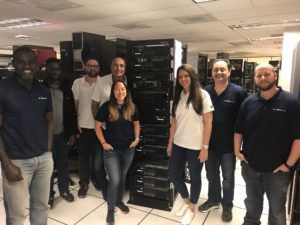When it comes to running Datacore’s SDS platform, our customers are not limited to specific vendors or fabrics because it runs on commodity hardware as well as enterprise-class systems. And like many of our customers’ environments, in our own development lab at DataCore headquarters where the majority of system-level testing is performed, commodity hardware co-exists alongside enterprise-class systems.
Commodity hardware has played a big role in DataCore’s history. In this post I’d like to dive into what that looks like at present and how it shapes our promise for the future.
What does “commodity hardware” mean?
In laymen’s terms, it means affordable computer hardware that is non-specialized, lower in cost, easy to obtain, and capable of running Microsoft windows and Linux without any special devices or equipment. Commodity cluster computing is a large number of low-cost, low-performance computers working in parallel instead of using smaller quantities of high-performance, high cost proprietary computers. What this means for DataCore customers is the more commodity hardware connected and running the software, the more powerful the cluster.
What kind of hardware does DataCore support in the QA lab?
There is a diversity of DataCore-supported commodity hardware configurations in the QA lab, as well as enterprise-class hardware equipment as well.
Can you tell me a little bit more about DataCore’s history using commodity hardware?
When DataCore started over 20 years ago, the majority of the hardware that was utilized in development in the QA lab was commodity. The strategy back then was to install our software on low-cost, lower-performance commodity hardware that worked in parallel to outperform the high-dollar, big metal boxes of proprietary hardware vendors. This tried and true approach is still proven today.
However, over time, the need to support enterprise-class systems with DataCore increased and we found that our ability to tremendously increase the performance of commodity hardware could be applied to these proprietary systems. Thus, the combination and elegant balance of high-end and commodity hardware support made DataCore a leader in the industry and has been critical for our continued success.
Is it still necessary to balance commodity and high-end hardware in QA at DataCore?
Of course. Priority one at DataCore is the success of our customers. As such, it is imperative that we continue to support commodity hardware for organizations that simply cannot afford, or don’t need, expensive proprietary equipment. But at the same time, it is equally important to support enterprise-class systems for that segment of our customer base. By striking that balance, we deliver the flexibility to support and supercharge our customers’ diverse storage environments to deliver ongoing value, no matter the underlying hardware.
What type of commodity hardware is used at DataCore in QA?
Here is a small example of the various types of hardware that is used in QA here at DataCore:
- Servers: both low- and high-end
- HBAs: A variety of FC channel HBAs
- Disk drives: Assortment of low- and high-end storage
- Disk controllers: Assortment of low- and high-end storage adapters
- Disk arrays: FC and ISCSI
- ISCSI controllers: Low- and high-end ISCSI adapters
- ISCSI switches: Low- and high-end ISCSI switches
- FC switches: Low- and high-end FC switches
For further information please visit DataCore’s qualified hardware components support.
Why is it necessary to have mixture of high-end and commodity hardware in QA here at DataCore?
One of our main objectives in QA is to exercise and validate that our software is both compatible with, and meets the high testing expectations of, multiple vendor types of commodity and high-end hardware. This certifies that whatever type of hardware our customers decide to install or integrate DataCore with will work to perfection. Whichever hardware our customers choose, we take it to the next level by turning it into high-performance supercharged workhorses.
Want to see for yourself? Request a demo!
How do you improve low-cost commodity hardware?
Short answer: install DataCore!
Once installed, you’ll start seeing performance gains almost immediately, as well as improvements in scalability, availability, flexibility, and manageability.
- We improve scalability – DataCore has the capability to manage and perform extremely well under an increased or expanding workloads or scope when hardware resources are added.
- We improve availability – with DataCore, data is always on and available.
- We improve flexibility – DataCore gives you the ability to easily modify your computer environment and deliver powerful and robust data services across all your storage types no matter the vendor, workload or architecture.
- We improve performance – DataCore provides the highest performance at the lowest total cost of ownership.
- We improve manageability – From DataCore Insight Services to cloud integration, and from container orchestration to encryption and much more, DataCore provides you access to a wide assortment of management tools.
